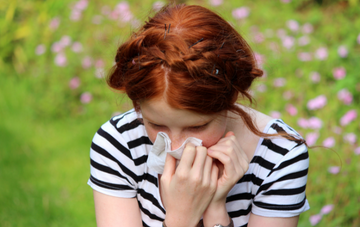
My Top Ten Tips to Combat Spring Allergies and Hay Fever
Spring is well and truly upon us now in the Northern Hemisphere! I could not be more delighted. With a gorgeous array of budding flowers, brighter days and warmer weather, it’s easy to see why. But unfortunately, one slightly less glamorous element of this sunnier season is the allergies that often accompany it, particularly hay fever. Read on for my Top Ten Tips to combat Spring allergies and hay fever.
While seasonal allergies may be considered an annoyance; they are generally deemed harmless. However, in severe cases, allergies can have a long-term impact our bodies. So, I have compiled a shortlist of my top tips that will help reduce the effects of pollen and other seasonal allergens.
My Top Ten Tips For a Hay Fever Free Spring
1. Change clothes when you get home
Pollen sticks to your clothes when you’re outside, which can explain the continuation of symptoms after you get home. Changing into different garments as soon as you get home could help prevent this.
2. Dry clothes indoors or tumble dry
Although washing your clothes removes pollen, drying them outside can lead to pollen sticking to them again. So whilst it is tempting to take advantage of the warm spring sun, If possible, tumble drying clothes or hanging them inside can stop pollen from getting to them.
3. Monitor the weather forecast
If you keep a close eye on the weather forecast, you can generally indicate the pollen count for the day. You can also find out the pollen count from your local news website. If the pollen count is high, it may be best to stay indoors.
4. Defend your nose
If pollen stops getting into your nose, hay fever symptoms will reduce. One method is by applying Vaseline, or another barrier product designed specially to prevent allergies, around your nostrils to trap pollen.
5. Stop smoking
Cigarette smoke will irritate the lining of your airways and make allergies worse. Smoking is so dangerous to health – in every respect – please quit now. There’s no better time to do it!
6. Go towards the sea
Like cigarette smoke, air pollution can exacerbate hay fever symptoms, occurring more regularly in big cities. On a gorgeous spring day, heading towards the ocean can reduce air pollution, and the sea breeze blows pollen inland.
7. Eat a spicy meal
If your symptoms include a stuffy, blocked nose, spicy food can help. Chilli can help to widen airways and make it easier to breathe, while other spices such as turmeric are natural anti-inflammatories.
8. Stay away from foods that produce Histamine.
Histamine is the chemical your body produces in response to infection and causes swelling that protects your body. However, in people who suffer from hay fever, histamine is released when there is no need to protect the body. There are some foods that contain histamine or encourage your body to produce more of it and these should be avoided – they include pickles, cured and smoked meat and fish, nuts, and alcohol.
9. Eat berries, beans, apples and more
A quercetin flavanol in green vegetables, berries, beans and apples can suppress histamine production. As a result, foods rich in beta carotenes such as carrots, spinach, and yellow fruit can soothe a blocked nose and painful sinuses.
10. Try a herbal tea
Various herbal teas may help to manage your hay fever. For example, camomile and nettle tea both have antihistamine and anti-inflammatory properties.
Conclusion:
To conclude, I wanted to address antihistamines: these drugs are the most common treatment for hay fever and can be used when you experience allergic symptoms. They can also be used as a preventative measure during your hay fever season. However, some antihistamines may make you drowsy and dramatically dry up your mucus membranes – which can cause itchy eyes and other typical hay fever symptoms to get much worse. Therefore, pharmaceutical antihistamines should only be used as a last resort instead of the first line of defence.
Prepare your immune system before the allergies start!
As ‘they’ say, an ounce of prevention is worth a pound of cure! If you suffer from seasonal allergies, consider seeing a professional health care practitioner before symptoms start. They will work with you to ‘prime’ your immune system so that you are less reactive when the allergens explode into the atmosphere! The Complementary Medical Association is the world’s leading professional association for the very best practitioners and training schools. CMA Registered Practitioners work holistically to prime your immune system to make you less susceptible to allergens. A wide variety of natural health approaches are shown to be of great benefit – including homoeopathy, ayurveda, nutrition, Traditional Chinese Medicine (including acupuncture, chiropractic) and more. If you wish to find a local practitioner for treatment options, please feel free to visit The CMA website, where you’ll find a comprehensive database of qualified experts.
If you have any questions regarding holistic allergy treatments, please feel free to message me below or reach out on one of my platforms. I adore hearing from you.
All my love,
Jayney xoxo
Tags: hay fever, Hayfever, Seasonal allergies



Changing clothes is a new one on me and I will certainly be giving it a go. As always Jayney, you provide simple, practical ideas we can all try. Thank you.
Thank you Celia – I hope this has worked well for you. Jayney xx